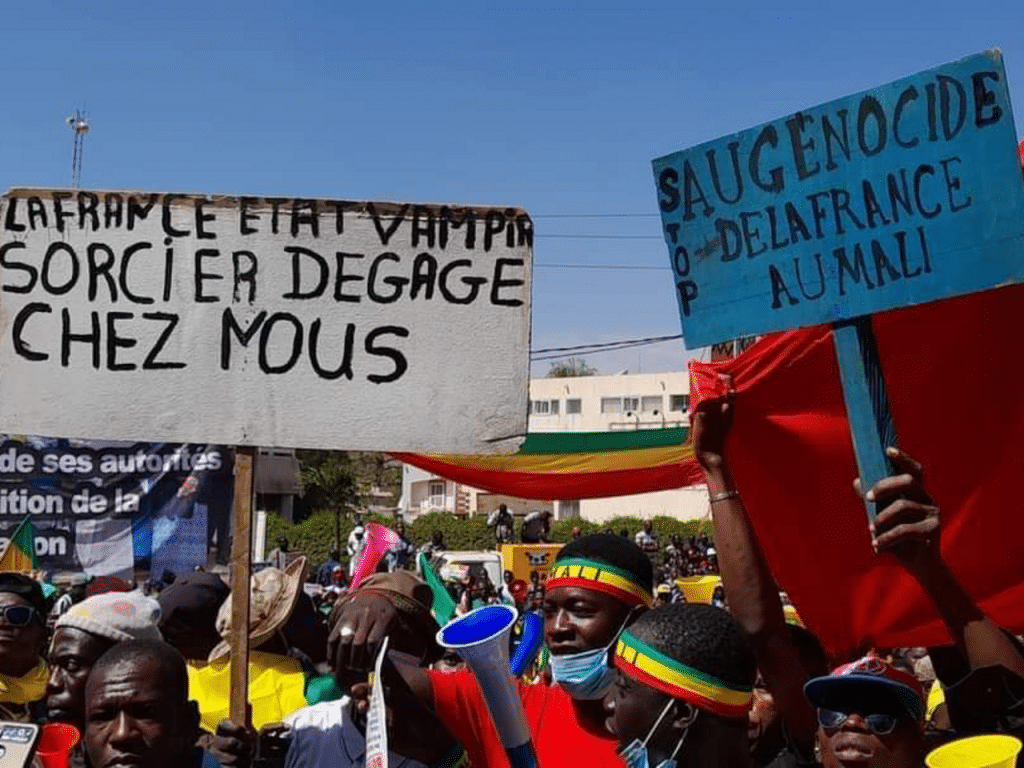The ruling junta in Mali called for demonstrations against the sanctions imposed on the country by the Economic Community of West African States (ECOWAS), which were a success for the military. Hundreds of thousands, and perhaps even millions of people, took to the streets in Bamako and in the cities of the country’s interior, from the north to the south and through the center. It is difficult to estimate the size of the crowd. What is certain, though, is that the Malian population has expressed its anger at the harsh ECOWAS sanctions that have effectively placed the country under an embargo. This response is worrying for France and its regional allies, who intended to put pressure on the military to organize elections as soon as possible and hand over power to “civilians.”
Indeed, these sanctions will suffocate the Malian economy. They close the country’s borders with ECOWAS member states, freeze Malian state assets held by the Central Bank of West African States (BCEAO), and suspend trade with Mali (except for basic necessities). Malians feel their national pride trampled. Of course, not all those who participated in the demonstrations did so as endorsement of the junta’s long, four-to-five-year transition plan, but the mobilization clearly expressed support for the military in the face of international “partners.” In this sense, the military government is probably more legitimate today than it was a week ago; it may even have become one of the most “legitimate” governments in the region.
This development was foreseeable from the beginning, as the harsh ECOWAS sanctions had a fairly high risk component.
The popular reaction is not only strengthening the military, but also deepening the “anti-French sentiment” that had been gaining ground in the country — a former French colony — for some years. Another risk was that these sanctions would increase the popularity of foreign powers competing with France in the region, notably Russia but also China. In photographs from the demonstrations, some Russian flags can be seen among the crowd.
Thus, while the Malian military’s decision to propose a five-year “transition” plan was clearly a mistake, there are now growing doubts about the appropriateness of the ECOWAS response, which is supported by France, the United States, the European Union, and the United Nations.
The anger over the ECOWAS sanctions among the working class, youth, and Mali’s poor is more than legitimate. For now, though, it is being channeled by the military into its policy of national unity. And for that, the junta can count on the help of trade union leaders and religious leaders and organizations. It remains to be seen how long this unity can hold given the class contradictions of an economic situation that will become increasingly serious. In the medium term, that unity will obviously not be able to hold with the same strength. But as long as the sanctions remain in place, the military will be able to secure the support of an important part of society.
We will need to watch for whether anti-imperialist sentiments develop within sectors of the working class and the youth that enable them to break out of the framework imposed by the junta. In fact, the military is using popular support with an eye toward improving the balance of power in its favors in negotiations with French imperialism and its allies — but not with the perspective of breaking with imperialism. Still, if the military junta finds itself on the ropes economically and social pressure increases, some sectors — including local elites — could push for a more confrontational stance with France while advocating a possible rapprochement with China and Russia.
In other words, relations between Mali and France could deteriorate in a lasting way — even if the strategy adopted by French imperialism works. Indeed, economic sanctions could even succeed in getting the better of the Malian military and forcing it to capitulate. But among the population, France’s image could suffer a decisive blow. Moreover, people throughout the region are watching events in Mali very closely, and some have already expressed that they are fed up with the French presence in Africa. Some form of anti-imperialist sentiment, however confused, could take root in the entire region.
France cannot afford such a political evolution in this part of the continent, which would endanger its hold on West Africa. Indeed, France’s position as a world power depends largely on the political, economic, and military control it exercises in Africa and the Mediterranean basin.
The anger of the workers and youth of Mali against ECOWAS and French imperialism is more than legitimate. But it is not by backing the military that they will put an end to neocolonial domination. The working class and all the exploited and oppressed will very quickly find that a dead end. They must find a way to build their own political organization that is class-based and independent of the imperialists, but also independent of the army and of the different factions within the national bourgeoisie, which since Mali’s independence has demonstrated that it knows how to continue accommodating foreign powers.
First published in French on January 15 in Révolution Permanente.
Translation by Scott Cooper











